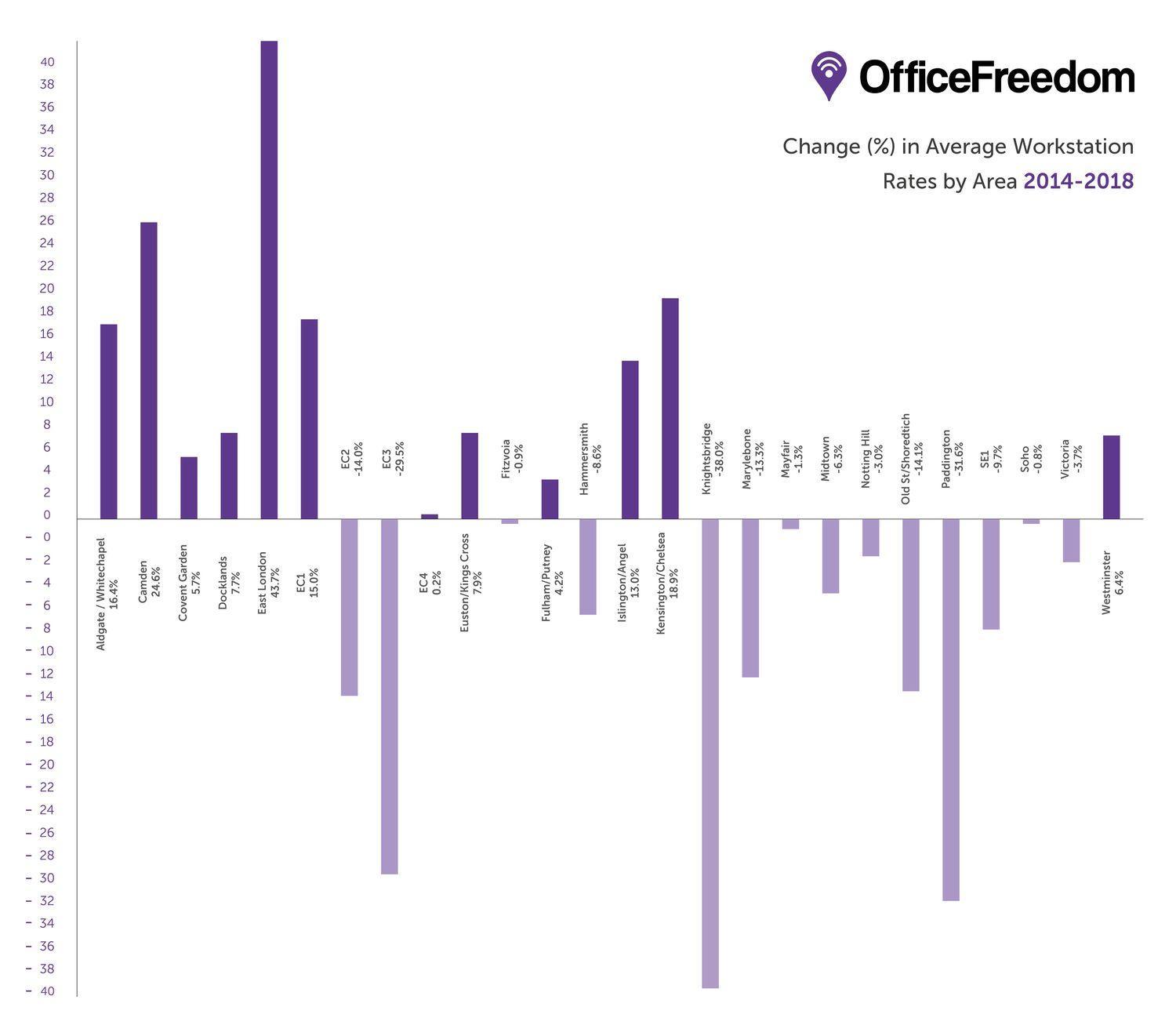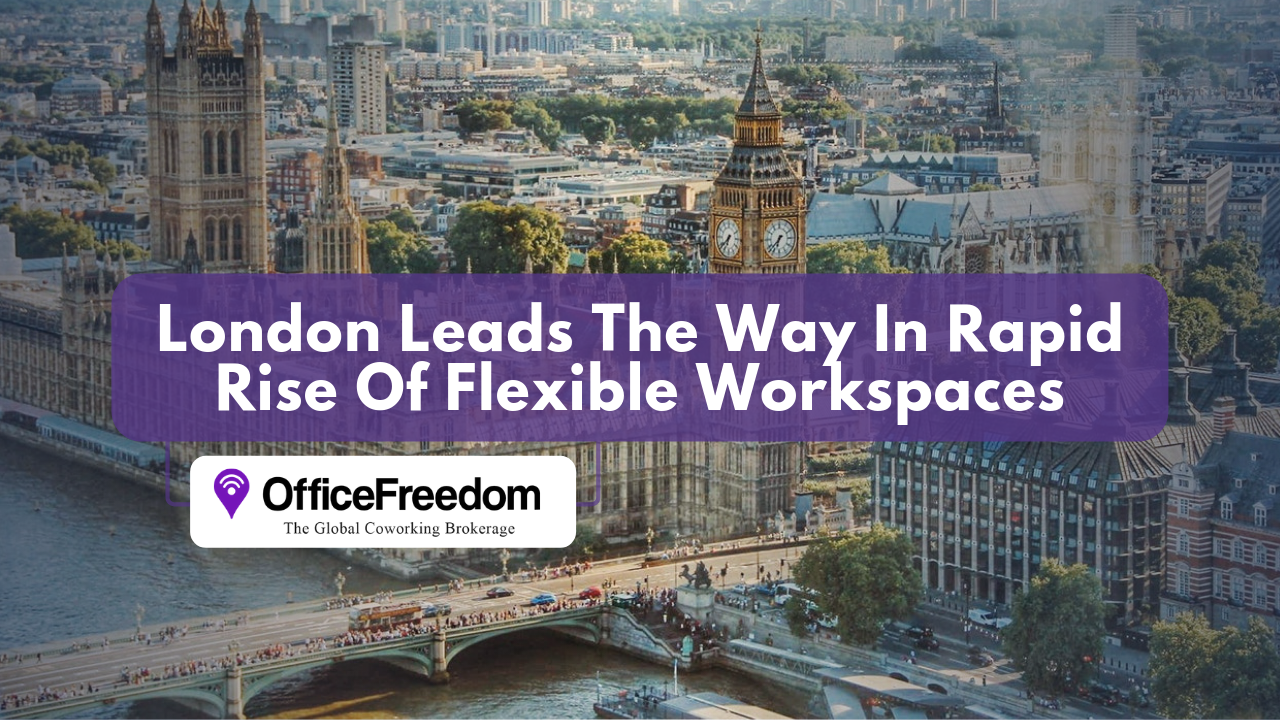This article was written by Office Freedom
- A recent report by office brokers Office Freedom found that London is at the forefront of the flexible workspace market.
- The report also found that increased competition in key areas has caused workstation rates to decline.
- In areas where demand is outpacing supply, workstation prices have increased by up to 17%.
Over recent years, we have witnessed significant changes when it comes to the workplace. Women are continuing to push through the glass ceiling, offices are starting to look more like homes and businesses are opting for a more flexible and sociable work environment.
This rise in flexible workspaces is just one of the latest trends to emerge from the corporate world, and according to a report by office brokers Office Freedom, London is at the forefront of this growing market.
More Workspaces in Central Places
Having analysed data from over the past five years, the report states that the number of new workspaces in Central London grew by 42% in the last year alone – making the city one of the highest growth markets of flexible workspace in the world. On average, a new coworking space opens in London every 5 days.
In the same year, it was reported that throughout the capital, over 1,300 new flexible workspace locations were available, showing a 9% increase year-on-year. This increase was also reflected in a rise in the number of hybrid work centres that combine coworking and serviced office space in London.
But why are flexible workspaces proving to be popular?
Today, we live in a world where workers are looking for a job that offers more than just a salary. They are looking for a company that provides the full package; a positive working environment, good employee benefits and small perks that help their well-being. As a result, many businesses are trading a more traditional private office for a modern coworking space.
In many flexible workspaces, workers can enjoy modern facilities such as on-site gyms, break out areas, roof terraces and even on-site restaurants. What’s more, with the number of highly-skilled freelancers working in London rising well into the millions, the need for a collaborative workspace or small desk space is more in demand than ever before.
From a business perspective, many large corporations are choosing to move to a flexible workspace for more reasons that just attracting and retaining staff. These new flexible workspaces provide agility, all-inclusive costs, less risk, potentially cheaper rates and the ability to quickly scale up or down.
Competition is Causing Rates in Key Districts To Decline
Last year, the average workstation rates in London ranged from £328 to £871. However, due to the expanding market and the presence of more operators, these prices have fallen across many key areas of the city.
For example, despite having remained as the most expensive area for office for five consecutive years,
Knightsbridge has experienced a significant 38% drop in rates. Similarly, both Paddington and Hammersmith have seen office prices fall by up to 32% in just the last two years due to the greater availability of flexible workspaces.

Inevitability, the increase in supply is a huge benefit for the city, providing space for more businesses to settle and more choice for finding the ideal space. However, for competing operators, this growing trend is adding pressure to undercut competitors and rely on the expertise of office brokers to secure new tenants.
Vibrant London Districts Are Causing a Shift in Station Rates & Sales Figures
While Office Freedom has seen workstation sales grow 30% year-on-year, some areas are starting to outperform others in terms of selling more desk spaces. Consequently, prices are going up.
Unsurprisingly, vibrant areas such as Old Street and Shoreditch have grown by a staggering 69% since 2014. This is largely due to the area becoming a significant hub for Fintech companies, many of which have only continued to flourish over the years. However, recent investments in improving these areas have also meant that businesses are benefiting from better amenities, transport links and local facilities.
A similar increase has occurred in both Aldgate and Whitechapel, with Office Freedom’s transactions for these areas increasing by 63% between 2017 and 2018 alone. Key areas such as Soho, Covent Garden and Victoria have also seen large increases in workstation sales and continue to be attractive areas for businesses.
According to the report, Docklands saw one the biggest drops in the number of workstation sales, with sales more than halving in the last year. This reflects a continuing trend which has seen a 75% drop over the last five years due to weakening demand for the Dockland location. Today, many companies are preferring to opt for city centre locations to benefit from better transport links, vibrant business communities and more comprehensive amenities.
Seeing a more positive impact, flexible workspace in Shoreditch, Camden, EC2 and other vibrant areas continues to be in high demand, and the standard of office space is increasing alongside the prices.
Rates in Camden have increased by 25%, most likely due to the strength and quality of the LABS flexible workspace. Similarly, as businesses continue to look for office space in Islington/Angel and major operators remain absent from the area, prices have increased by up to 17% as a reflection of the constant demand.
New Business is Keeping Office Brokers Busy
With demand rising across the city, it’s no surprise that business has been brisk for many leading and independent office brokers.
According to Office Freedom, their workstation sales grew by 30% year on year in 2018 and major players such as Mindspace, WeWork and Regus have also seen high growth and provided additional London inventory over the past five years.
New serviced operators such as Knotel have also entered the market and rapidly expanded their portfolio thanks to this growing trend. In turn, this demonstrates that the popularity for coworking and flexible workspace is something that businesses, brokers and the city can all benefit from.
The Future of London Workspaces
From analysing the data provided in the report, it’s clear that a lot has changed over the past five years. The market is undoubtedly thriving, and as businesses continue to search for a new type of workplace, it is set to expand further in the future.
Despite the current uncertainty regarding the UK economy, businesses are still looking for new ways to grow and flexible workspaces are providing a great way to provide better facilities for staff and operate in the busy city environment with less risk.
So, if you’re looking to expand into a new space, relocate or join a more social coworking space, why not make London your new home?



 Dr. Gleb Tsipursky – The Office Whisperer
Dr. Gleb Tsipursky – The Office Whisperer Nirit Cohen – WorkFutures
Nirit Cohen – WorkFutures Angela Howard – Culture Expert
Angela Howard – Culture Expert Drew Jones – Design & Innovation
Drew Jones – Design & Innovation Jonathan Price – CRE & Flex Expert
Jonathan Price – CRE & Flex Expert












